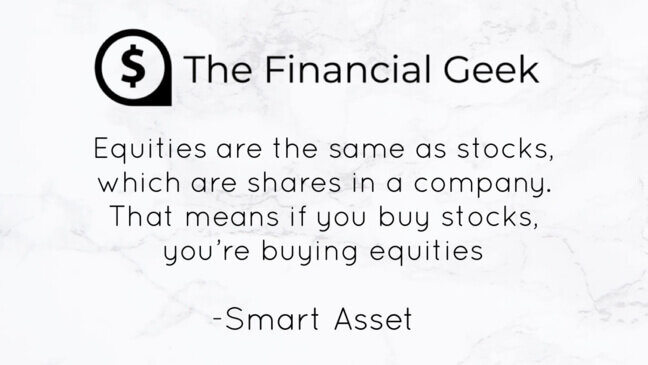If you are new to investing, you might not know the ins and outs of how it all works, but you’ve likely heard about stocks before.
Due to its liquidity and high growth potential, stock investing is one of the most attractive forms of investment.
If you’ve decided it’s time to start investing in the stock market, you might be wondering whether or not stocks will earn you interest.
In short, stocks do not earn interest for their owners. While stock owners can generate returns from their investments, they do not come in the form of interest payments.
| Starting to Invest? | Our Recommendations | Start Trading Today |
|---|---|---|
 |
Wealthsimple Trade ($25 Bonus)Only in Canada
|
Start Trading TodayRead our Review |
 |
Robinhood InvestOnly in USA
|
Start Trading Today |
In order to generate interest income from your investments, you need to invest in fixed income securities such as Bonds, GICs, CDs, Money Market Funds or Savings Accounts.
Stocks provide investors with returns in the form of dividends and capital gains, which we discuss in more detail later in the article.
But for now, just know that stocks do not earn interest.
So, if you are an investor who wants to earn interest income, then you’ll need to invest in some fixed income securities.

Compound Growth Tool From Getsmartaboutmoney.ca
Quick Note #1 – People often use the term “compound interest” in investing even when they are referring to stock investments – what they really mean is compound growth.
Examples
If you don’t fully understand what I stated above, allow me to further explain using a few short examples.
Example #1
Chris only invests in stocks and nothing else.
In other words, Chris doesn’t invest in any form of fixed income such as Bonds, CDs, GICs, Money Market Funds, T-Bills….etc.
Because of this, Chris won’t earn any form of interest income.
Remember, stocks don’t earn interest – and Chris only invests in stocks.
Example #2
James on the other hand loves low risk investments and therefore he only invests in fixed income securities.
Because James never invested in any stocks, he will never earn any dividend income, but he will earn interest income.
Why? Because he invested in fixed income securities, and as mentioned above, fixed income investments provide returns in the form of interest payments.
Quick Note #2 – Some types of fixed assets can generate capital gains or losses such as bonds.
Example #3
Lastly, Emily invests in both equities (stocks) and fixed income.
In fact, 20% of her portfolio is in fixed income investments while the other 80% is invested in stocks.

Because Emily invests in both equities and fixed income, she will earn interest income plus any other income generated from her stock investments.

What Type of Income Do Stocks Earn?
You should now know that stocks don’t earn interest for their shareholders.
But now let’s talk about the two forms of income that stocks do generate:
-
Dividend Income
-
Capital Gains
Dividend Income
Dividend income is generated when companies give back a portion of their profits to their shareholders.
Dividends can either be paid out monthly, quarterly, semi annually or even annually.
While I won’t go into detail about dividends in this article, an important thing to note is that not all companies payout dividends to their shareholders.
Notable Companies that Don’t Pay Dividends
-
Amazon
-
Google
-
Facebook

Notable Companies that Do Pay Dividends
-
Apple
-
Microsoft
-
AT&T
Capital Gains
Broadly speaking, the concept of a capital gain is pretty straight forward
A capital gain is basically just the profit you make from selling a certain asset.
Although we are referring to stocks right now, you can earn a “capital gain” by selling anything that you own for a higher price than you bought it for.
For example, in its simplest form – if you buy a stock for $100 and then sell it for $200 in the future, well you made $100 in the form of capital gains.
Capital gains income is not as passive as dividends or interest income as it requires you to take action in selling the stock.
As you can now see, while stockholders don’t earn interest income from their stocks, they can still generate investment income in the form of dividends and capital gains.
What Investments Earn Interest
If you’ve read this far, you now know with certainty that stocks don’t earn interest, however, as mentioned earlier in this article, certain investments do generate interest income.
While there are many forms of fixed income investments available to investors, I will just briefly highlight a few of them.
Bonds
A bond is a type of lending investment where you lend your money to an organization in return for regular interest payments plus your principal back upon the bond’s maturity.
Organizations are considered to be banks, government agencies or companies.
Investing in bonds is a great way to invest your money in a low risk security that will earn you a better rate of return than typical savings or even high interest savings accounts.
GIC (Guaranteed Investment Certificate)
Similar to a savings account, a GIC is a very safe investment that offers Canadian investors a guaranteed (CDID Insured) rate of return – usually a fixed amount.

GICs have maturity dates where their funds are locked into the security for a specific period of time.
If you withdraw your money before the GIC’s maturity date you will be forced to pay a penalty fee.
T-Bills (Treasury Bills)
A T-bill is another form of debt obligation that is fully backed by the US treasury department.
T-Bills are usually short-term investments with maturity dates only extending out 1-year.
Similar to most types of fixed-income securities, the longer the date to maturity is, the higher the interest rate will be.
Money Market Funds
Money market funds are similar to mutual funds where they hold a number of different securities within the fund.
These securtires can include, but are not limited to, CDs, repurchase agreements and US treasury securities.
If you think you may need your money in the short term, and you don’t want your investment to decline in value, money market funds could be a great option for you.
High Interest Savings Accounts
While most people wouldn’t consider a savings account an “investment”, they will provide you with fixed income in the form of interest payments.
If you don’t want to lock your money into something like a bond, GIC or T-bill, a savings account is a great way to earn interest on your money while still keeping it readily available.
However, due to the liquidity of this money, your interest rates will likely be lower than the other investments discussed above.
For more information on each of these fixed income investments, check out another similar article by the Financial Geek “Does a TFSA Earn Interest”.
In this article we go more in depth on each form of investment and talk about the types of interest rates you can expect to generate
Conclusion
To wrap things up, let’s summarize some of the key points made throughout the article.
After all, if you are anything like me, you probably just scrolled to the conclusion anyway!
If so, here is what you missed:
-
Stocks do not earn interest. Interest is paid to investors who loan money to organizations such as banks, large corporations and governments.
-
If you want to invest in stocks, know that the two forms of investment income they can provide are dividends and capital gains.
-
If you love the idea of investing in safe securities that make regular interest payments, consider putting your money in fixed income securities such as bonds, GICs, T-bills, money market funds or even a high interest savings account.
Quick Note #3 – While we didn’t discuss it in this article, it’s important to note that interest income is taxable.
And that is it for me! I hope this article sparked your “interest”!


![What Happens if No One Sells a Stock? [Complete Breakdown]](https://thefinancialgeek.com/wp-content/uploads/2022/12/Featured-Image-26.jpg)



